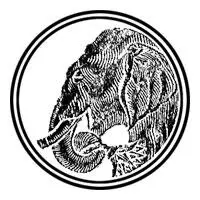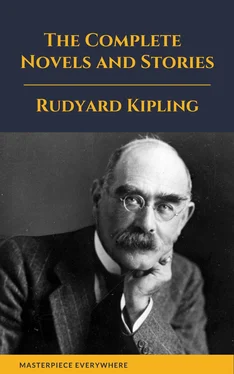‘A marvel indeed. Two days and two nights without food! Where was the Sahiba?’ said Kim under his breath.
‘Yea, my Soul went free, and, wheeling like an eagle, saw indeed that there was no Teshoo Lama nor any other soul. As a drop draws to water, so my soul drew near to the Great Soul which is beyond all things. At that point, exalted in contemplation, I saw all Hind, from Ceylon in the sea to the Hills, and my own Painted Rocks at Such-zen; I saw every camp and village, to the least, where we have ever rested. I saw them at one time and in one place; for they were within the Soul. By this I knew the Soul had passed beyond the illusion of Time and Space and of Things. By this I knew that I was free. I saw thee lying in thy cot, and I saw thee falling downhill under the idolater—at one time, in one place, in my Soul, which, as I say, had touched the Great Soul. Also I saw the stupid body of Teshoo Lama lying down, and the hakim from Dacca kneeled beside, shouting in its ear. Then my Soul was all alone, and I saw nothing, for I was all things, having reached the Great Soul. And I meditated a thousand thousand years, passionless, well aware of the Causes of all Things. Then a voice cried: “What shall come to the boy if thou art dead?” and I was shaken back and forth in myself with pity for thee; and I said: “I will return to my chela , lest he miss the Way.” Upon this my Soul, which is the soul of Teshoo Lama, withdrew itself from the Great Soul with strivings and yearnings and retchings and agonies not to be told. As the egg from the fish, as the fish from the water, as the water from the cloud, as the cloud from the thick air; so put forth, so leaped out, so drew away, so fumed up the soul of Teshoo Lama from the Great Soul. Then a voice cried: “The River! Take heed to the River!” and I looked down upon all the world, which was as I had seen it before—one in time, one in place—and I saw plainly the River of the Arrow at my feet. At that hour my Soul was hampered by some evil or other whereof I was not wholly cleansed, and it lay upon my arms and coiled round my waist; but I put it aside, and I cast forth as an eagle in my flight for the very place of the River. I pushed aside world upon world for thy sake. I saw the River below me—the River of the Arrow—and, descending, the waters of it closed over me; and behold I was again in the body of Teshoo Lama, but free from sin, and the hakim from Dacca bore up my head in the waters of the River. It is here! It is behind the mango-tope here—even here!’
‘Allah Kerim! Oh, well that the Babu was by! Wast thou very wet?’
‘Why should I regard? I remember the hakim was concerned for the body of Teshoo Lama. He haled it out of the holy water in his hands, and there came afterwards thy horse-seller from the North with a cot and men, and they put the body on the cot and bore it up to the Sahiba’s house.’
‘What said the Sahiba?’
‘I was meditating in that body, and did not hear. So thus the Search is ended. For the merit that I have acquired, the River of the Arrow is here. It broke forth at our feet, as I have said. I have found it. Son of my Soul, I have wrenched my Soul back from the Threshold of Freedom to free thee from all sin—as I am free, and sinless. Just is the Wheel! Certain is our deliverance. Come!’
He crossed his hands on his lap and smiled, as a man may who has won Salvation for himself and his beloved.
the end
▲▲▲
STORIES
Plain Tales From the Hills
by Rudyard Kipling

Calcutta: Thacker, Spink and Co.
London: W. Thacker and Co. 1888
plain tales from the hills
▲▲▲
Preface
Lispeth
Three and—an Extra
Thrown Away
Miss Youghal’s Sais
“Yoked with an Unbeliever”
False Dawn
The Rescue of Pluffles
Cupid’s Arrows
The Three Musketeers
His Chance in Life
Watches of the Night
The Other Man
Consequences
The Conversion of Aurelian McGoggin
The Taking of Lungtungpen
A Germ-Destroyer
Kidnapped
The Arrest of Lieutenant Golightly
In the House of Suddhoo
His Wedded Wife
The Broken Link Handicap
Beyond the Pale
In Error
A Bank Fraud
Tods’ Amendment
The Daughter of the Regiment
In the Pride of His Youth
Pig
The Rout of the White Hussars
The Bronckhorst Divorce-Case
Venus Annodomini
The Bisara of Pooree
A Friend’s Friend
The Gate of the Hundred Sorrows
The Madness of Private Ortheris
The Story of Muhammad Din
On the Strength of a Likeness
Wressley of the Foreign Office
By Word of Mouth
To be Filed for Reference
To
THE WITTIEST WOMAN IN INDIA
I Dedicate This Book
Eight and twenty of these tales appeared originally in the Civil and Military Gazette . I am indebted to the kindness of the Proprietors of that paper for permission to reprint them. The remaining tales are, more or less, new.
Rudyard Kipling.
▲▲▲
Look, you have cast out Love! What Gods are these
You bid me please?
The Three in One, the One in Three? Not so!
To my own Gods I go.
It may be they shall give me greater ease
Than your cold Christ and tangled Trinities.
The Convert .
She was the daughter of Sonoo, a Hill-man, and Jadéh his wife. One year their maize failed, and two bears spent the night in their only poppy-field just above the Sutlej Valley on the Kotgarh side; so, next season, they turned Christian, and brought their baby to the Mission to be baptised. The Kotgarh Chaplain christened her Elizabeth, and “Lispeth” is the Hill or pahari pronunciation.
Later, cholera came into the Kotgarh Valley and carried off Sonoo and Jadéh, and Lispeth became half servant, half companion, to the wife of the then Chaplain of Kotgarh. This was after the reign of the Moravian missionaries, but before Kotgarh had quite forgotten her title of “Mistress of the Northern Hills.”
Whether Christianity improved Lispeth, or whether the gods of her own people would have done as much for her under any circumstances, I do not know; but she grew very lovely. When a Hill girl grows lovely, she is worth travelling fifty miles over bad ground to look upon. Lispeth had a Greek face—one of those faces people paint so often, and see so seldom. She was of a pale, ivory colour and, for her race, extremely tall. Also, she possessed eyes that were wonderful; and, had she not been dressed in the abominable print-cloths affected by Missions, you would, meeting her on the hill side unexpectedly, have thought her the original Diana of the Romans going out to slay.
Lispeth took to Christianity readily, and did not abandon it when she reached womanhood, as do some Hill girls. Her own people hated her because she had, they said, become a memsahib and washed herself daily; and the Chaplain’s wife did not know what to do with her. Somehow, one cannot ask a stately goddess, five foot ten in her shoes, to clean plates and dishes. So she played with the Chaplain’s children and took classes in the Sunday School, and read all the books in the house, and grew more and more beautiful, like the Princesses in fairy tales. The Chaplain’s wife said that the girl ought to take service in Simla as a nurse or something “genteel.” But Lispeth did not want to take service. She was very happy where she was.
Читать дальше













